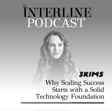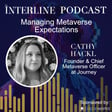Become a Creator today!Start creating today - Share your story with the world!
Start for free
00:00:00
00:00:01

Talking Circularity, Innovation, And A Sustainable Vision for Fashion - With Save Your Wardrobe
Emma speaks to Hasna Kourda, Founder and CEO of Save Your Wardrobe - a platform and an ecosystem designed to streamline the post-purchase experience, across repair, maintenance, and upcycling.
Together, they discuss the pathway to systemic change, and a vision for sustainable fashion.
Transcript
The Shift to Sustainable Fashion
00:00:07
Speaker
There is a lack of leadership, there is a lack of risk taking, that's for sure. Whenever we talk months later they come back to us and say, listen, we weren't mature, but now we think that it's time for us to to to to pick up the pace and implement something.
Introduction to Hasna Koda and Save Your Wardrobe
00:00:35
Speaker
Hello, everybody. Emma here, your host of the Interline podcast. This time on our show, we're talking to Hasna Koda, the founder and CEO of Save Your Wardrobe, which is a platform and ecosystem designed to adapt to the needs of brands and retailers, streamlining the post-production experience through reservation and after-sale service management, covering repair, maintenance, and upcycling. In 2023, Save Your Wardrobe was awarded the Grand Prix.
00:01:04
Speaker
of the LVMH Innovation Award alongside five other winners, as well as becoming the winner of a special prize awarded for Data and Artificial Intelligence.
Hasna Koda's Inspiration and Background
00:01:15
Speaker
And earlier this year, Hasna joined our editor, Ben, on stage at Premiere Vision Paris to talk about the true scope of modern extended product lifecycle. I wanted to speak with Hasna because I was fascinated by her story, which forms the foundation of Saviour Wardrobe as a company. Hasna was born and raised in Tunisia, has a background in economics and corporate strategy.
00:01:36
Speaker
with a deep commitment to circularity and zero waste. Her grandmother practiced upcycling by transforming old garments into kilums, traditional hand-woven rugs used to cool homes during Tunisia's scorching summers. Inspired by this rags-to-rugs tradition and her observations of overconsumption in Europe, Hasner conceived the idea for savior wardrobe, rooted in the belief that real circular fashion is about maximizing the use of items that people already have in their closets.
00:02:05
Speaker
I really enjoy talking to Hasna about her journey and how Savior Wardrobe is driving systemic change in the fashion industry, the practical solution that brings together global brands, local businesses, and consumers. Just before we get into my conversation with Hasna, I want to introduce the sponsor for today's episode, Sourcing at Magic, the milestone fashion event by Magnet Group, formerly in former markets fashion.
00:02:31
Speaker
Sourcing at Magic is back for its second annual Sourcing at Magic New York event, from the 22nd to the 24th of September. The perfect opportunity for fashion stakeholders to discover a globally diverse selection of manufacturers and suppliers who can provide low minimums, speed to market and sustainable solutions. This season, verified sustainable exhibitors are being spotlighted across all magnet group events, including Magic and Coterie New York.
00:02:58
Speaker
to help forward eco-friendly and ethical consumption efforts across the entire supply chain. Sourcing at Magic is proud to be the leading trusted voice and research to their fashion community, and the event in New York this September will be a continuation of Magic's 90th anniversary this year. You can find out more about the New York event or the slate of 2025 shows by visiting www.sourcingatmagic.com.
Hasna's Career Journey and Achievements
00:03:24
Speaker
Now over to my chat with Hasna.
00:03:26
Speaker
Hasna, welcome to the show and it's really exciting to have you here today. Thank you so much for having me. I'm i' really thrilled to be here. Wonderful. So I want to start right at the beginning. Can you introduce yourself and tell us a little bit about your career and the journey that took you to founding Save Your Wardrobe? Yeah, sure. So um I am Tunisian. I grew up in Tunisia and my background is mostly in applied economics. So after graduating high school, I went to Paris and studied there. I did a business school and then a master's in applied economics, focusing on how to manage financial resources. um my my When I grew up, I was surrounded by a family that was caring for ah the the circularity and and they were
00:04:22
Speaker
tons of prices for for their efforts. um And so I was really early on attracted by those those values. and um And then I've started working with ah with with the French Embassy actually in Tunisia. And and that's when I realized, because Tunisia is a big country for manufacturing, or used to be.
00:04:46
Speaker
and and I've realized that there is a big weight in the the supply chain and manufacturing and after that I worked in the UK for a company called the Ethical Fashion Forum and that's when also I realized that all the focus of sustainability was towards the supply chain and manufacturing and sustainable materials. But everything that happens post-purchase wasn't really um interested. there's and There wasn't much interest in in that side of of the spectrum. So I've decided to dig a little bit into it. And and that's how I came up with Sebi wardrobe.
00:05:30
Speaker
That's really wonderful. I think we don't always hear about such personal stories, although obviously everybody has one, but I love that it was a family connection and that's how you got into such an important cause. um And you're right. I think there's a lot of focus on the supply chain and we really should be focusing on the whole chain. um so So it's really important work. Fantastic. And I guess that is what LVMH recognized as well.
00:05:59
Speaker
Xavier Wardrobe, yeah you were the winner of the Grand Prix, I hope I'm saying that right, um which was presented at, thank you. um So that was presented at VivaTech in 2023 last year. ah Yeah, so more than 1,300 startups applied from 75 different countries and you won. So what does winning this prize ah mean to you and how has it changed the way that you worked before.
Impact of LVMH Award and Growth in Paris
00:06:30
Speaker
Erin, it's not any prize. It's LVMH is a leader in in luxury. It's one of the biggest group. It's actually the biggest group. um And so having our work recognized in in a way that is ah that is celebrated by ah the biggest brands is incredible. um And also, it's ah our solution wasn't
00:06:56
Speaker
It was the first time actually that they were rewarding a solution that wasn't selling ah something to to the customer, but actually supporting them in extending the life of their government and things that they have already. So that beautiful narration of ah legacy, of um of cherishing the treasures that you have.
00:07:17
Speaker
I was really proud to carry that the the prize and also to share it with the team who's done an incredible work to ah to step up the the work at Sebi wardrobe to an enterprise level. And and I'm really, really ah proud to also work with the the brands of of the group and help them ah set up um industrialized processes for the after sales strategies.
00:07:44
Speaker
Yeah, absolutely. And um I think, am I right in saying you were able to open a new office because I think you have operations in Tunisia and in Paris now and in London.
00:07:55
Speaker
um Yeah, the the prize was was definitely a catalyst for for growth ah for us. Our office in Tunisia was already there, but ah we managed to to grow ah and and also reiterate on the tech side of things.
00:08:13
Speaker
and And thanks to La Maison des Startups, we were also able to um to have an office in in the heart of Paris in one of the biggest co-working space or incubator for for startups, so Station F. um So that's also helped us incredibly to to to grow and meet with like-minded people.
00:08:39
Speaker
Fantastic. And how long can you be there for? um Is there a limit on the time that you're there, or um can you be there for as long as you like? So officially, officially we were meant to be there for 12 months, but they kindly extended our stay. So um it looks like they they like us. So ah they offered us to ah stay longer and and keep our our desks there.
Collaborations with Brands for Sustainability
00:09:04
Speaker
That's fantastic. I'm so glad. um Yeah. Really lucky. We had an incredible VIP. Yeah. They, they took ah really good care of us and as, as they should, but I know nothing is.
00:09:17
Speaker
Nothing is given, you know, for no reason. It's very well-earned. I want to talk a bit about your partnership with Magé. Are they Magé? They're a French brand, um if I'm correct. there They are, yeah. So Magé, well, it was also thanks to to to the price where that recognition helped us accelerate as well our ah pipeline and the brands who are or groups we were discussing before that ah felt like it was time to to also adopt a sturdy after-sales strategy so we
00:09:56
Speaker
have helped the group, actually the SMCP group, so Sandro, Maage, Clodipiello, and Fursac, set up and design ah processes for the after-sales. Xavier Woodrum has built the this whole, um not just the operational side, but also structure to ah to connect ah the the whole ah all the stakeholders of the post-purchase experience.
00:10:24
Speaker
Right. No, that's that's really important. um And I guess brands like that are so important to recognize ah the work that you do because um I wonder if it's it's still growing um and that leads me to my next question. How in your experience are brands thinking about the true extended product lifecycle at the moment? Is there a sentiment that making clothing last longer is a threat to new business or are businesses um receptive to the idea that aftercare and services need to become necessary parts of their business
Fashion Industry's Technological and Strategic Shifts
00:11:01
Speaker
models? um Yeah, is there resistance or is there more
00:11:04
Speaker
ah excitement I guess. I mean no actually there there is excitement there is definitely curiosity and there is a will to ah put in place um ah repair and care at scale um but we also have to to understand the the context where um the industry is not doing ah the the it's not doing as well as it used to. And and now the strategies are different. And we see a ah polarization in in in brands, segments of brands, whether especially those in the middle, they have to choose between upscaling and go towards luxury, which means ah re
00:11:47
Speaker
thinking their whole supply chain and rethinking as well their the customer experience. Or on the other side, they um they go for automation and ultra-fast fashion to speed up the go-to-market presence. And so because of that polarization, both of the ends need to to differentiate themselves from the competition and need as well to implement strategies to ah respond to to um to higher growth, which means higher risks of defects, which means also that there might be in the market items that after one or two years will have ah issues, manufacturing issues. So they they need to to take that responsibility as well if they want to accelerate and automate their supply chain. And on the other side, if they upscale and and they promise ah ah longevity and durability, they also have to
00:12:46
Speaker
put in place, repair, care, and other strategies to to to meet the expectations of their their clients. so i think yeah I think brands are not necessarily looking at... ah It used to be the case a decade ago where Planned Obsolescence was part of the of the strategy to um to have you buy new, buy more. But now that ah era is is gone and brands are really ah realizing that they can't ah go ah still take to have the same the same strategy or old ways of of doing business. and um And they are learning. So I wish they they they were faster.
00:13:39
Speaker
but um butcha it's ah its ah's ah it's not an industry that um that adopts technology in the same way as others. Yeah, I guess it's much more difficult to in some ways and maybe this is a provocative question but do you think that brands or I guess the people within brands genuinely want to adopt sustainability and more sustainable practices or Is it more to do with, as we know, the legislation that's coming in and and how consumers are demanding more? What do you think would happen if there weren't these this pressures? Yeah, from a personal level, what I've seen and all the people i'm I'm talking to, they are genuinely interested in exploring better ways of doing business and better ways of
00:14:30
Speaker
ah selling their items. They are they are proud of ah the the brands they work for, and they wish to improve the the the products, they wish to improve the customer experience. So there's a real genuine motivation, but this motivation has to also meet the the the cold numbers. and And that's where they need startups like us, like Save Your Wardrobe to support them in better understanding the different strategies that are in front of them, but also help them do the the different calculations to make the business are lucrative and profitable. um And so it's not, again, generally, at least the people I've met, um they want to make it work, and and they they need help.
00:15:24
Speaker
to to make numbers work as well. And so this is where our growth um is also ah it's also kind of and ah meeting the ah the the expectation of those brands and um and also finding ways to to develop AI solutions to ah to understand the numbers, their forecasts and their projections.
00:15:51
Speaker
and and make sure that any circular strategy they would implement will ah will also me be profitable and and and something easy to sell to the to their hierarchy.
00:16:05
Speaker
Right. And you've mentioned two things that I want to talk about next, which is growth and also AI and these new technologies that have come in, especially in the last, I think it's like three years. um What are some of the biggest challenges you've had to face when building out your platform? And have you seen things change for Save Your Wardrobe a since you started in 2020, as you've grown your B2C and B2B coverage?
00:16:35
Speaker
Now, we've been implementing AI since 2018, actually, um whether it's for image recognition or for for different ah for different features to improve on the back end, things that are not feature-led but product-led.
00:16:59
Speaker
So we've been using AI for a very long time, and and there there is incredible opportunities ah in improving the the features that we have with, ah let's take just the example of image recognition. There is incredible potential to to to use that to remove bottlenecks. Something we've seen, and i and I'm a big believer that technology for the sake of technology isn isn't going anywhere, but If you have the the right use case, if you have the right pinpoint to solve, AI can ah can help remove a lot of frictions. It doesn't do all the job.
00:17:39
Speaker
but it it definitely can support in in improving the many things. um So we we are strong of all these years of ah machine learning and improving the tech behind the scene. And now we are able also to ship the market to some brands, ah products that are AI ah powered and that are state of the art while keeping also the century-long or age-long skills and craft.
Leadership and the Circular Economy
00:18:15
Speaker
So that's why I really love about Save Your Wardroops, that we are making technology ah help or support um those crafts that are that would be lost ah otherwise. Yes, for sure. And I guess that's one of the challenges today, is balancing the new with
00:18:38
Speaker
ah legacy and the heritage and like you said you said something earlier so beautiful but you know treasuring your clothes and i think there is a real beauty in that that i'm hoping just you know takes off more and more obviously through through platforms like saviour wardrobe um and My next question, we've sort of touched on it before about the pressures of of change and and what's really going to fuel a transition towards a more circular economy. And I spoke about legislation, we've spoken about voluntary brand action and consumer behavioral change. ah Who do you think should be the leaders here? Should it be the brands? Should it be the consumers, um as we have said,
00:19:25
Speaker
things are taking a long time. And I do think that is a bit to do with the legislation, but where does yeah where does the the the lead need to come from? I mean, legislation can definitely push but push for for adoption, but it's it's rarely something that brands will do ah happily. They will just abide with by the minimum.
00:19:52
Speaker
ah Whereas if they realize it's ah it's a market push, so it comes from the consumers. And without that, they're jeopardize their growth. I feel like it's ah it helps accelerate adoptions. There is a lack of leadership, there is a lack of ah risk taking, that's for sure. ah Whenever we talk to brands they they that are unwilling to change their that their their ways. We realized that six months later they come back to us and say, listen, we weren't mature, but now we think that it's time for us to to to to pick up the pace and implement something. um Some brands are just like checkbox. It's a checkbox exercise. They they would say, okay, let's do the minimum. I want to communicate about it and that's all. There isn't any yeah
00:20:52
Speaker
and yeah any ground to it or anything that can build be built on top of it. So there is still that. And and I put it in ah on the back of lack of taking risk and lack of of of leadership visionary leadership. um But this is changing. um And I think that the industry is also waking up to ah to to um to a fast fashion hangover.
00:21:22
Speaker
and and realizing that the 20 years that they spent ah pressurizing the their supply chain manufacturers and and really ah not investing in ah in the quality of their items is catching up with ah with their business. And we can see that some brands had to close down or to file for administration, ah whereas others who have seen the importance of ah of sustainable scale and sustainable growth um have been much more agile on with adopting circularity. Right, exactly. um And as i I've said before, I think it's really not easy. So I feel for those brands that have had to
00:22:12
Speaker
um shut down or go into administration. Perhaps it was not entirely their fault. I know that it's a complex thing to do, scaling. so it's ah It's an industry that often puts pressure on costs, on workers. um it's ah There is a health aspect that has been ignored and it's never easy to shut down a business and I can definitely feel for the for the the employees, for even the leaders who who didn't want
00:22:49
Speaker
necessarily want to shut up their their businesses.
Future of Save Your Wardrobe and Fashion’s Human Element
00:22:52
Speaker
but um But sometimes the reasons are called and they could have ah taken better decisions earlier on that would have saved their business. But like I mentioned, the lack of risk taking and and en vision um has also ah played a disadvantage for them. Yeah, absolutely. um And that's such an important point. We do forget sometimes about the human face of of fashion. And yeah, that's why I think Saviour Wardrobe does really bring us back to that. um Of course, being in line with all of the important legislation and um and consumer mindset going forward. So you're in a great place to be.
00:23:41
Speaker
And a little bit about scaling. we We've spoken about this a bit now. But as part of the big the big picture, how do you see the circularity ecosystem growing? and Because onboarding service partners is going to be a big part of the picture. How are you approaching scaling ah your business? And I don't know if you have any advice for others who not necessarily in the same space, but yeah how do you see circularity growing? I think it has to grow at the same pace as the the business. so we focused We are focusing on the B2B now, and um and something that is really interesting to discover was that ah many brands have their had the or have their their network of vendors and service providers, partners.
00:24:34
Speaker
but they didn't ah they didn't industrialize it or didn't have it structured. So it was um and the responsibility of the store manager. It was very manual. And now they are realizing that something that they used to have needs ah needss structure, needs scale, needs a tech solution like ours.
00:24:57
Speaker
And so this is something that we've provided for sure makes the the scalability easier because we don't have to scout for those for those ah the the vendors and providers. But at the same time, um we have to also digitize an aspect that has never seen. um So it's still very manual pen and paper. So we have a big ah work to do in ah in in the in penetrating those those vendors, very traditional tailors with tech tools. And um and most of them, because ah they're all family businesses, they take on from ah from parents to to children, and the children are really keen to ah to to to add technology and to modernize their parents' business. And um and so that eases a little bit to the skeletal
00:25:54
Speaker
but a scalability part. And on the other hand, um what we found a successful full ah strategy was to to have the brand support those local businesses and and make sure that they are not left behind. So there is some sort of ESG responsibility when it comes to local businesses, how these brands can ah can can grow sustainably and help their community ah grow at the same at the the same way.
00:26:29
Speaker
Yes. And I think it's important not to rush, I guess, you know, that it's, that's one of the things, again, that's layered because there is an urgency, of course, this, the matter of sustainability, it is urgent, but at the same time, you can't push something too fast. Like you said, it's a family business, then there, there's a lineage, a heritage. And that has to be translated with, uh, with the tech side. So.
00:26:54
Speaker
but Something that we've discovered ah early on is ah is that to implement a successful repair and care after sales strategy, you had to replicate the way those brands work with those tailors, seamstresses in an IT t level.
00:27:15
Speaker
and and then and the yeah ah or plug the add-ons, whether it's ah automation of communication or payment automation or logistics. And and so that helps create a fully connected ah ah sort of nervous system. And without it, you stay manual and you kind of ah ah restrict the growth of of circularity businesses. Exactly.
Tech Solutions in Sustainable Fashion
00:27:48
Speaker
And there's never going to be a reason to do technology just for technology's sake, as you said. um And do you have any recommendations for businesses listening who might want to start implementing ah new technology? Do you have any software or hardware categories that you see as being complementary to not only your ambitions, but I guess for others as well?
00:28:11
Speaker
that are essential for extending the lifespan of garments and feeding into circularity. um Something that I kept hearing ever since I started Xavier Wojobie, which I don't really like, is the notion of quick wins. And it can be ah something that people take, oh, let me do this. is ah It's a quick win. know But then you you are not building some the structure or the foundation of ah of a sustainable business.
00:28:42
Speaker
because of that. And so my advice would be to first think outside the box, um check what is What is there out there? What are the businesses in resale, in rental, in repair and care? And take the problem on the other side. So don't think that what does these startups are doing, I'll do better. Whereas if you are from solving the pain point early on and meeting with the brands and meeting with your clients and knowing actually
00:29:16
Speaker
ah who your clients are, then you are able to build a value that will be easier to sell later on.
Collaborative Efforts and Future Innovations
00:29:25
Speaker
Whereas if you feel like, oh, there there is a momentum in resell or there is a momentum in rental and momentum in in repair and um I want my share of that.
00:29:37
Speaker
um then you can ah really easy rep easily replicate the same mistakes as ah the the startups or the companies. And so my advice would be to think outside the box and um build foundations and rely less on quick wins.
00:29:55
Speaker
Yeah, that's really solid advice. And it's it's great that you can share these things because obviously it's still a competitive environment. But you know i I do believe that in this journey towards a better future for all of us, collaboration is going to be essential. um so So you're in inside. It takes a village. It takes a village, exactly. it takes a ah country or or more. Hasna, my last question to you is what's next for you and for Save Your Wardrobe? Do you have anything that you can share with us on the horizon? um We have very, very exciting product releases that are coming very soon. So um we are a business that do things differently. and We have an app while we are a B2B business and the app is
00:30:48
Speaker
is there to help us test and learn. and um And so something very exciting coming up really soon is an AI-based feature that will help people understand, educate them actually on ah on what can be, yeah how repairs work in general. um And I'm really excited about that because This will be taken to a whole other level ah in the customer experience in the enterprise level, removing a gigantic bottleneck and also a and adding knowledge and and understanding on how things are are built, made and and repaired. So I'm very, very excited about those
00:31:37
Speaker
features that are coming up and and obviously we will be continuing our work to with ah with ah with brands and retailers to ah to make ah repair and care more accessible to to customers. That's really exciting. Well, the Interline will be watching the journey closely and let us know if, let us know the secrets. No, but um it's it's been really. Yeah, we can do a follow up on this. Yes, absolutely. um But it's been really wonderful talking to you today, Hasna. Your insulates are going to be super helpful for our audience. And um yeah, we'll we'll talk again soon. Thank you. Thank you so much. Thanks, Emma. Thank you, the Interline.
00:32:25
Speaker
Thanks again to today's sponsor, our friends at Sourcing at Magic, for supporting this episode of the show, just like its events in Vegas. Sourcing at Magic New York, taking place from the 22nd to the 24th of November, provides a space for important conversations on responsible fashion, sustainability, and community building, offering valuable guidance for fashion professionals across all stages of business. Don't miss the fusion of fashion and innovation at Sourcing at Magic.
00:32:52
Speaker
Explore with style intertwines with technology, offering a glimpse into the future of sourcing. More than just events, Magnet and Sourcing at Magic within the group is a deeply rooted community who are working towards fulfilling the vision of a more connected, sustainable, collaborative fashion industry. You can find out more year round by visiting w www.com and look out for more collaborations between the Interline and the teams at Sourcing at Magic.
00:33:20
Speaker
and magnet soon. I hope you enjoyed my conversation with Hasna. Be sure to give Save Your Wardrobe a follow on their social media platforms and look out for some exciting partnerships and developments in their pipeline. There are many more exciting guests in our podcast schedule, so make sure you don't miss an episode and subscribe to the Interline Podcast, wherever you listen to podcasts, and give us a follow on LinkedIn and Instagram. Also be sure to subscribe to our weekly newsletter, where we give you our analysis on the biggest stories of the week in the world of fashion technology. Finally,
00:33:51
Speaker
keep an eye out for the Interline's annual Sustainability Report that will be released at the end of September. The report will be an exploration of the current state of fashion in terms of environmental and ethical advancements, along with recommendations for actions needed from all stakeholders to expedite essential changes. It's really important reading for all stakeholders in today's fashion world, so look out for the report when it drops later this month. Thanks very much for listening. Bye for now.


















